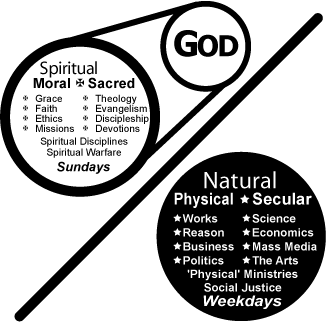 A real problem for many in the Church today is a tendency to divide the world into mutually exclusive compartments. One component is labeled “sacred” and has to do with the spiritual life. Everything else goes into a “secular” category. For those who hold this divided view of reality, the consequences are profound. While they may love Jesus as their spiritual savior, they may fail to honor him as Lord over all areas of life. An invisible line divides their personal faith in Christ, their church attendance, worship, prayer life, and Bible study from other areas of life such as their work, leisure time, or care for their physical bodies. Anything that is labeled “secular” is assumed to be of little concern to God. Christianity is narrowed down to a scheme for spiritual salvation. The cross is a ticket to heaven and little more.
A real problem for many in the Church today is a tendency to divide the world into mutually exclusive compartments. One component is labeled “sacred” and has to do with the spiritual life. Everything else goes into a “secular” category. For those who hold this divided view of reality, the consequences are profound. While they may love Jesus as their spiritual savior, they may fail to honor him as Lord over all areas of life. An invisible line divides their personal faith in Christ, their church attendance, worship, prayer life, and Bible study from other areas of life such as their work, leisure time, or care for their physical bodies. Anything that is labeled “secular” is assumed to be of little concern to God. Christianity is narrowed down to a scheme for spiritual salvation. The cross is a ticket to heaven and little more.
These are a few of the personal consequences, but there are other consequences as well. When this divided understanding of reality takes hold within a church, it results in the separation of the church from its surrounding culture. Sunday worship services and vocations in “full time Christian service” are assumed to be more valuable than seemingly “secular” pursuits in areas such as the arts, law, politics, social services, care for the physical needs of the poor, and so on. Little effort is made to connect the core doctrines of the Bible to cultural and civic life. Little effort is made to encourage church members to serve as salt and light (Mt. 5:13-16), bearing witness to the truth in all areas of society. Evangelism is pitted against care for the poor. “Full-time Christian service” is pitted against careers in law, business or politics. One compartment is higher and the other lower. The church is sealed off from society. It exists in a Christian “ghetto” with its own sub-culture of language, media, and entertainment. When the divided mindset impacts churches, they become impotent and ineffective at impacting culture. Rather than discipling the nations as Christ commanded, the values and dominant beliefs of the surrounding culture influence and shape the church.
Despite this, there is cause for hope. God is at work in our generation. He is active around the world leading his bride back to a comprehensive, undivided understanding of reality. He is reminding his followers that he is Lord not merely of some limited spiritual realm—he is Lord over all! He created the spiritual and the physical realms and cares for them both. He seeks to be glorified not only in the church building, but also in the home, the school, the company, the courthouse and the houses of government equally. Furthermore, he is reminding his bride that while he passionately and actively seeks and saves lost people trapped in sin (1 Ti. 2:4), his redemptive plan is far grander. He is about the business of redeeming all things distorted through the Fall (Col. 1:19-20). It is this all-encompassing redemptive agenda that he calls his Church to participate with him in.
– Scott Allen






10 Comments